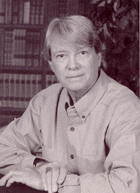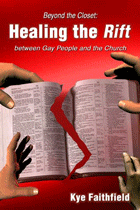
 Larry Hamilton reviews...
Larry Hamilton reviews...Beyond
the Closet:
Healing the Rift Between Gay People and the Church
by Kye Faithfield
Healing the Rift Between Gay People and the Church
by Kye Faithfield
| Larry
Dean Hamilton holds a Bachelor of Arts in English Literature from The
University of Texas at Austin. Previously on the editorial staff of
Time-Life Books, Larry was a key organizer and participant in Houston
Gay Conference 1982. He led the way in establishing and organizing
Matagorda County AIDS Awareness. Larry, a sometime poet, treks along a
sandy shore, mindful of accumulated litter and debris—mindful
of
earlier footsteps. Larry's other books, besides A
Gathering of
Angels (here),
include three books of poetry: Hotel
Chelsea and the Sound, Late
Autumn Debris, and Love
is
Orange. Larry can be reached by e-mail at larry@sigmalogobooks.com. More information about A Gathering of Angels can be found at www.sigmalogobooks.com. |
by Kye Faithfield
Paperback, 338 pages
PublishAmerica, 2004
ISBN 1-4137-1730-6
“One golden thread weaves more profoundly throughout the Bible than any other theme. It is the stage upon which the panorama of events, both human and Divine, plays out...the very essence of God Himself...eternal, life affirming, all-encompassing...Love.”
Kye Faithfield in Beyond the Closet: Healing the Rift between Gay People and the Church plunges into the murky waters of modern western Christianity, a troubled and troubling pool co¬habited by Church/Religion and Sex/Sexuality. Ms Faithfield sets out a principal aim, “to make the Bible come alive for us,” seeing “it [as] imperative that gay and straight Christians alike re¬examine and understand the broader spiritual dimensions of our...faith.” To that end, Ms Faithfield attempts to take a new look at what she terms Biblical “policy”—“an examination, at the fundamental level, of what Christianity really means...to address...in the language of the layperson...matters of both traditional and gay Christianity.”
One of the means Ms Faithfield utilizes in the pursuit of her goal is a more thorough look at specific words and wording as they appear in translations of the Bible from its extant, original sources. Faithfield, admittedly neither a linguist nor a scholar of the ancient languages of the Bible, relies on accepted and thoroughly researched scholarly references readily available—material not ordinarily found on the bookshelves and coffee tables of modern Christians. The author brings to her work more than half a century of faith and devotion; her ease and familiarity with Scripture is immediately noted, as well as is her life of diligent meditation and her depth of spiritual awareness.
Faithfield is not a self-appointed Evangelist. She expresses the need held by many GLBT persons to find acceptance and community within mainstream Church and Religion. “Gay Christians I have known are not anti-traditionalists who want to overthrow the sanctity of marriage or the church; they simply want to share in it.” Briefly hinted at, Faithfield’s own life is a story that compels, growing up “in a sleepy little New Jersey village in the 1950s...even before the word ‘transgender’ was a word.... There was no such thing as gay liberation; gay pride back then was mostly gay shame... As a Christian, it was not easy growing up gay in the fifties.” Ms Faithfield speaks of growing up an African-American youth who first discovered his gay identity, only later to recognize and struggle with transgender identity. “I know what it means to be gay. I know what it means to be transgender. I even know what it means to be straight. In the humbling quest for identity, I have lived all three lives.” The author’s personal story is secondary to the work she has produced. However, a reader simply cannot ignore the profound influence that underlies her writing. “If only someone—anyone—had been willing to reach out to gay people like me with love and the compassion of Christ, instead of making me feel guilty, dirty, worthless and un¬wanted, just for being me!” Ms Faithfield’s plaintive words, wrung from her half-century of life experience, ring today with the sound of truth—a truth as “imperative” as her motivation that resulted in the writing of the book.
In the aftermath of the 2004 Presidential Election, noted columnist Libby Post commented on 365gay.com: “There are plenty of red herrings that can be pulled out of the religious right’s jar to confuse the issue. But, the one we can’t let them get away with is the notion that God is on their side.... [T]hat’s what Hitler said. That’s what Joe McCarthy said. And, that’s what Osama bin Laden is still saying.”
Kye Faithfield’s Beyond the Closet points up the resounding need to establish clearer, more accurate understanding of what the authors of the Books of the Bible actually said and what they really meant. Current translations of the Bible abound with erroneous “interpretation,” a fact made abundantly clear by Ms Faithfield, delving into such Biblical accounts as the famously misquoted story of Sodom and Gomorrah. Through her comparisons with other Scriptures, Ms Faithfield identifies the “sin” referred to as being the sin of inhospitality, resulting in destruction of the cities. The sin of Sodomy is the sin of inhospitality, and a Sodomite—other than referring to a resident of the city of Sodom—is one who refuses to give hospitality. Both terms are erroneously used in describing any sort of sexual activity—though one may in fact discover Sodomy proliferating and Sodomites hard at work throughout much of present-day society!
Readers can tap into a larger body of understanding produced by, among others, historical scholars and theologians; works that provide a more accurate reflection of what authors of the Bible more clearly intended. Among such works are two volumes by John Boswell, cited by Faithfield, Same-Sex Unions in Premodern Europe, and Christianity, Social Tolerance, and Homosexuality. This reviewer will suggest as well A.N. Wilson, Jesus, A Life; Dr. Theodore W. Jennings, Jr., The Man Jesus Loved; Robert Goss, Jesus Acted Up; Reverend Robert Williams, Just As I am; and Incarnation, edited by Alfred Corn, with particular emphasis on the Gospel of John. It may seem incredulous that such information is easily available, but that Church leaders and clergy are either ignorant of its existence or choose to totally ignore it altogether!
Ms Faithfield’s book brings into focus the desire and drive of human beings—including GLBT persons—to give expression to the fundamental need for spiritual association within the larger community of man. A reader of Beyond the Closet will be touched by the tenacity with which Faithfield has held onto her faith in the face of exclusion by the very body she has sought to join. Her book also stands in solid affirmation of a growing awareness among GLBT persons that the Divine Plan of God includes and supports same-sex affection/attraction and transgendered persons; and that the Word of God, as expressed in the writings that comprise the Bible, in no way condemns or excludes such individuals or their right to behavior that is natural and consistent. Beyond the Closet is one of at least a trio of books recently published that encompass the truth of God’s love for all, including Christopher Hubble’s Lord Given Lovers, available at www.hubblebooks.com, and my recently published title A Gathering of Angels, available at www.sigmalogobooks.com. These and other such works help disseminate the larger message of God’s love, and they provide a voice to challenge traditional tenets of the Church and main¬stream religion. Such published works further attest to the spirituality of GLBT persons.
Beyond the Closet will not appeal to every reader; and not all readers will agree in toto with Ms Faithfield’s construct of Christianity. The author chooses to reference the Authorized King James Version of the Bible [KJV] owing to its more poetic language and because the KJV does not use the term homosexuality—noted by Ms Faithfield as being an inappropriate term, inasmuch as it does not describe any situation relative to that recorded by authors of the Bible and therefore conveys entirely incorrect rendering of Scriptural meaning. Faithfield’s book can be read in a straightforward manner, but the work is constructed to allow for additional study and meditation. Readers who opt for additional study may choose to use other translations more accessible to them. In addition to debunking some of the oft-quoted verses that are used to condemn same-sex affection/attraction persons, Faithfield takes on the “ex-gay movement” alongside Christians who exonerate themselves in passing judgment on others. She is not selective in her application of Christian doctrine. Her discussion of “gay delights” and sex outside of “marriage” are likely to bristle the hair of most GLBT persons. Readers must bear in mind that Ms Faithfield is drawing on her own awareness of the Word of God, and is expressing the interpretation that works for her. Many may agree implicitly with her interpretation, but for others Ms Faithfield’s words may provide the opportunity for personal reflection. How often is it that we as individuals take the time to put into words on paper exactly what we believe and how we practice our convictions? By the same measure, Faithfield gives her reader positive affirmation, in the stories of Ruth and Naomi, and Jonathan and David. Her discussions of other Scriptures provides ample support from the Bible of positive attitudes toward GLBT persons.
Kye Faithfield calls for a reassessment of Biblical and Scriptural treatment, in the belief that mainstream Christianity can reposition itself to accommodate the GLBT community. While this reviewer acknowledges that there are substantial numbers of people within the mainstream Church who do not share the extreme, fundamentalist conservatism views of the religious right, the prospect of powerful religious entities making change themselves, of undoing what for the previous thousand or so years they have doggedly contrived, seems slim indeed. Ms Faithfield has stepped forward on solid ground, but hers is but one small step among many that are needed. In a recent teen discussion group, a young gay male spoke up, “What we need is a new writing of the Bible!” I tend to agree with his courageous, enthusiastic pronouncement; except it is not a new writing that is needed, but a new and reliable translation that accurately reflects what the Bible’s authors really said and what they truly mean.
Additional information can be found at http://healingtherift.com.